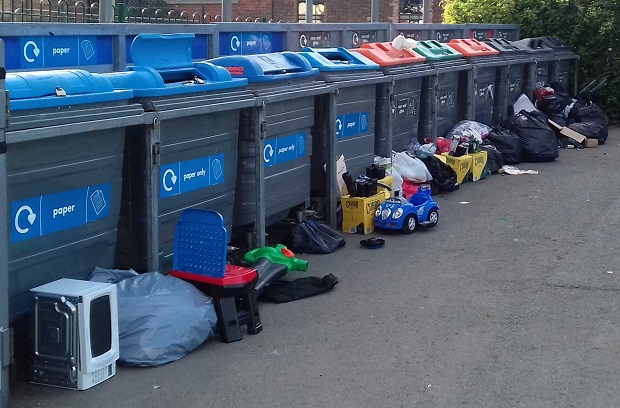Closure of recycling bring bank sites set to be approved
Shropshire Council is to close and remove its recycling bring bank sites, if the move is approved by the council’s Cabinet at its meeting next week (Wednesday 20 March 2019).
A six-week consultation into the proposals ended earlier this year and councillors are now being recommended to approve the closure.
Shropshire Council and its waste contractor Veolia currently provide bring banks at 120 sites across Shropshire. They are typically located in public, village hall and pub car parks. All of the sites have containers for glass, metal, cans and paper: some have banks for textiles, liquid cartons and small electrical equipment. Ninety per cent of materials collected at the sites can also be recycled from the kerbside.
The proposals don’t affect banks provided by private organisations on private land.
The removal of the sites would save the council £237,000 a year, increase the quality of material sent for recycling, help reduce flytipping and littering at the sites, and increase availability of car parking spaces (see notes).
The glass, paper and can banks are serviced by three Veolia vehicles, and each has a driver and a loader. The savings will be gained by removing vehicles and running costs and redeploying the drivers and loaders to take on work currently done by agency staff. The one-off cost of removing the banks would be £7,000.
The textiles and liquid carton banks are not serviced by Veolia and there would be no savings resulting from the removal of these banks. However, the report says that if they remain in place the sites would still be a focus for flytipping with associated management costs.
The electrical equipment containers were until recently supplied by a Producer Compliance Scheme (PCS) as an additional, free of charge, service related to a separate contract. This contract has recently been re-tendered and won by a different contractor, who will not be providing bring banks in future.
As well as financial savings, the report outlines a number of reasons for the recommended closure of the bring bank sites:
- In the past five years there has been a reduction in tonnage of waste collected from the banks, and this also constitutes a diminishing proportion of total recycling, as the overall recycling tonnage has increased over this period.
- There is a significant amount of other waste left adjacent to the banks, including furniture, children’s toys, and bags of mixed household waste (see photo). This is flytipping.
- The sites are provided for household use but are abused by traders who should be dealing with their waste through formal contracts with licenced waste collection companies, rather than relying on council tax payers to provide a service.
- The quality of material collected from these sites is low, due to non-recyclable contaminants being deposited in the banks. Each bank is clearly labelled with the waste stream it is designed to accept, but other materials are frequently deposited into the banks, including general mixed waste.
- From an environmental point of view it is more efficient to collect recycling as part of the kerbside service than via bring banks.
It is also expected that closure of the banks will lead to an increase in the household recycling tonnage. This is because there is better separation of waste at the kerbside and more waste will actually be passed for recycling.
Lezley Picton, Shropshire Council’s Cabinet member with responsibility for waste management, said:
“This proposal supports our aim to balance our budget in 2019/20 by making savings whilst minimising the impact on our recycling service, and on service users. We thank everyone that took part in our consultation, especially those who raised concerns, and I’m satisfied that all these concerns have been or will be addressed. It’s important to stress that there are established alternatives for householders in terms of kerbside recycling collections, and alternative charity and commercial bring bank services for textiles. Removal of the sites would also provide a range of benefits, including reducing flytipping and improving the quality of waste sent for recycling.”
The consultation ran from 14 December 2018 to 25 January 2019 and could be filled in online or via a paper form. A total of 270 formal responses were received, plus seven letters/emails from town councils and parish councils.
Responses to the consultation included concerns about a possible rise in flytipping, alternative recycling options, and concerns from residents who have limited household storage, no kerbside recycling service, and difficulties moving recycling boxes. These concerns are addressed in the report.
Some town councils and parish councils suggested sharing the cost of retaining sites in their areas, but the report suggests that it would be better for these councils to make their own arrangements with a private waste contractor.
If the recommendations are agreed by Cabinet, the sites are set to close this spring.
Notes:
- 42 sites are on council car parks, taking up space that would be released for parking.


